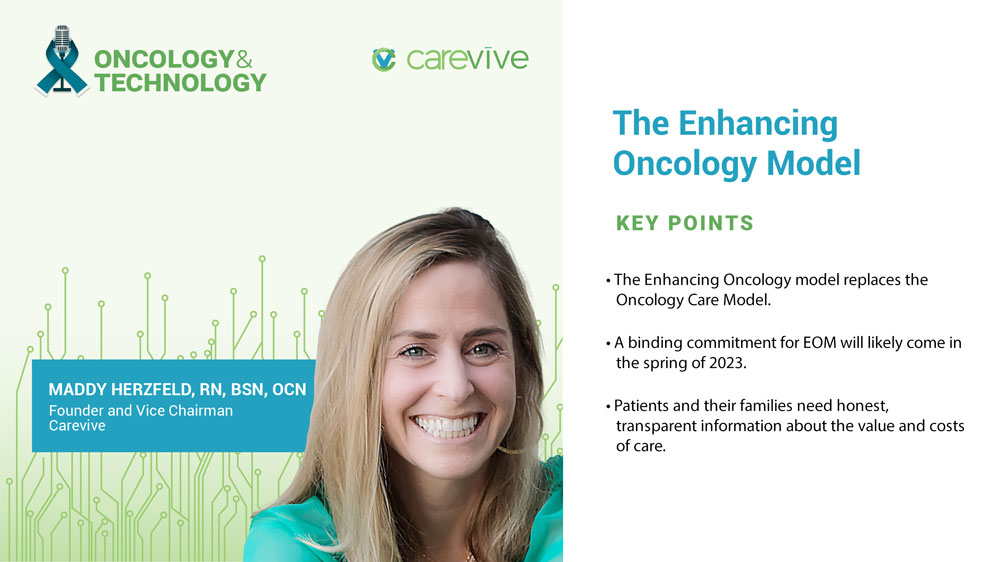
Summary
Through the Centers for Medicare and Medicaid Service (CMS) EOM, which is a replacement program for the phased-out OCM, or the Oncology Care Model, health providers have completed major improvements in cancer care in a cost-efficient way. Herzfeld, who is an oncology nurse, co-founded Carevive to revamp cancer care, and help cancer care providers meet their patient care goals.
“We wanted to support clinicians and patients with tools that all aimed to improve quality — so improve the patient experience and get better quality and better clinical and financial outcomes,” said Herzfeld.
With the end of OCM for EOM, Mooney and Herzfeld discussed the transition, and where organizations and providers are with the program’s five-year timeline that will begin effective July 1, 2023. Herzfeld said CMS defined “specific care transformation activities result in better clinical outcomes for patients.”
She added that the agency has generously funded a lot of practices that have participated in the program and made complete transformations to meet their guidelines. That often included patient care plans, survivorship care plans, and general quality care. Herzfeld also said the adjustments many practices incorporated have been a major encouragement in maintaining those changes and rejoining CMS’s efforts.
“So, for all of these practices that went through the test of time … they came back to CMS and were excited about all the changes that they had made based on this program and looking for what’s next with everything that we’ve done. That’s why CMS came out with this enhancing oncology model,” said Herzfeld.
Carevive is a major supporter of practices in deciding on EOM, and the entirety of the process. The new model introduces electronic patient-reported outcomes and patient visit monitoring, as well as health-related social needs, stated Herzfeld. However, one challenge of the program is the performance-based payment model, which means good performance is awarded and performance that doesn’t meet the mark translates into paying fees back.
This could cost practices in the long run. Herzfeld says Carevive is attentive to that because money can create more problems for a practice trying to meet these targets. “I want to be sensitive of course to the oncology care team, administrators — all the cancer programs out there. They want to do the best job possible. Like all of us everything comes down to dollars and cents,” said Herzfeld.
Of course, every practice might not feel that EOM is doable for them, and Herzfeld said that can come down to whether a practice decides to go with EOM or not. However, there are still other options. Herzfeld highly recommended that practices do prior data analysis research to help in their decision-making. EOM is likely not the ideal program for every practice, but in performing preliminary tasks, it can be a huge factor in the best outcome.
“It just means there are other avenues to put these quality metrics into place, so I think just making educated decisions and having data to do that is really, really critical,” stated Herzfeld.
